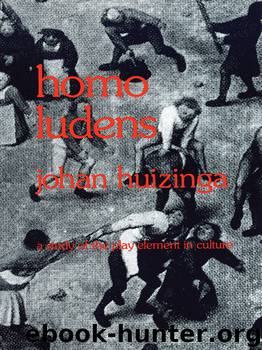Homo Ludens: A Study of the Play-Element in Culture by Johan Huizinga

Author:Johan Huizinga [Huizinga, J.]
Language: eng
Format: epub
Tags: Social Science, Computers, Programming, Anthropology, Cultural, Games, Social Psychology, Psychology
ISBN: 9780807097090
Google: 1ZADAQAAQBAJ
Publisher: Beacon Press
Published: 1970-01-02T00:00:00+00:00
The riddle is a sacred thing full of secret power, hence a dangerous thing. In its mythological or ritual context it is nearly always what German philologists know as the Halsrätsel or “capital riddle”, which you either solve or forfeit your head. The player’s life is at stake. A corollary of this is that it is accounted the highest wisdom to put a riddle nobody can answer. Both motifs are united in the Ancient Hindu tale of King Yanaka, who held a theological riddle-solving contest among the Brahmins attending his sacrificial feast, with a prize of a thousand cows.11 The wise Yājñavalkya, anticipating certain victory, has the cows driven away for himself beforehand, and sure enough defeats all his opponents. One of these, Vidaghdha Sakalya, unable to answer, literally loses his head, which separates itself from his trunk and falls into his lap. The incident is doubtless a paedo-gogic version of the theme that the penalty for not being able to answer was a capital one. Finally, when nobody dares to put any more questions, Yājñavalkya cries out triumphantly: “Reverend brahmins, if any of you wishes to ask any questions let him do so, or all of you if you like; or let me ask a question of any of you, or all of you if you like!” The play-character of the whole proceeding is as clear as daylight. Sacred lore is having a game with itself. The degree of seriousness with which the story was accepted in the sacred canon is as indefinable and in the last resort as immaterial as the question whether anybody really lost his head for being unable to answer a riddle. That is not the most curious thing about it. The chief, the really remarkable thing is the play-motif as such.
Greek tradition, too, has the riddle-solving and death-penalty motif in the story of the seers Chalcas and Mopsos. It has been foretold of Chalcas that he will die if ever he meets a seer wiser than himself. He encounters Mopsos and they enter upon a riddle-contest, which Mopsos wins. Chalcas dies of grief or kills himself out of chagrin, and his followers attach themselves to Mopsos.12 It is obvious in this case, I think, that the theme of the fatal riddle is there right enough, though in corrupt form.
The riddle-contest with life at stake is one of the main themes of Eddie mythology. In the Vafthrúdnismal Odin measures his wisdom against the all-wise giant, Vafthrúdnir, each asking questions in turn. The questions are of a mythological and cosmogonie nature, similar to those quoted from the Vedic texts: Where did Day and Night come from, Winter and Summer, and the Wind? In the Alvissmal Thor asks the dwarf Alvis how the various things are called among the Ases, the Vanes (the subsidiary Eddie pantheon), among men, giants, dwarfs and lastly in Hel; but before the end of the contest day breaks, and the dwarf is thrown into irons. The Song of Fjölsvinn has a similar
Download
This site does not store any files on its server. We only index and link to content provided by other sites. Please contact the content providers to delete copyright contents if any and email us, we'll remove relevant links or contents immediately.
| Africa | Americas |
| Arctic & Antarctica | Asia |
| Australia & Oceania | Europe |
| Middle East | Russia |
| United States | World |
| Ancient Civilizations | Military |
| Historical Study & Educational Resources |
Underground: A Human History of the Worlds Beneath Our Feet by Will Hunt(12081)
Sapiens by Yuval Noah Harari(5363)
Navigation and Map Reading by K Andrew(5147)
The Sympathizer by Viet Thanh Nguyen(4382)
Barron's AP Biology by Goldberg M.S. Deborah T(4137)
5 Steps to a 5 AP U.S. History, 2010-2011 Edition (5 Steps to a 5 on the Advanced Placement Examinations Series) by Armstrong Stephen(3722)
Three Women by Lisa Taddeo(3419)
Water by Ian Miller(3174)
The Comedians: Drunks, Thieves, Scoundrels, and the History of American Comedy by Nesteroff Kliph(3064)
Drugs Unlimited by Mike Power(2587)
A Short History of Drunkenness by Forsyth Mark(2283)
DarkMarket by Misha Glenny(2205)
The House of Government by Slezkine Yuri(2190)
And the Band Played On by Randy Shilts(2185)
The Library Book by Susan Orlean(2061)
Revived (Cat Patrick) by Cat Patrick(1987)
The Woman Who Smashed Codes by Jason Fagone(1957)
The Absolutely True Diary of a Part-Time Indian by Sherman Alexie(1899)
Birth by Tina Cassidy(1899)
